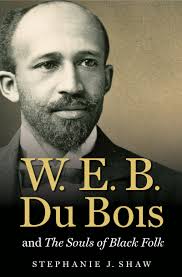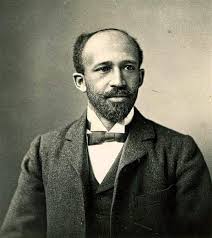The Souls of Black Folk Page #22
The Souls of Black Folk is a 1903 work of American literature by W. E. B. Du Bois. It is a seminal work in the history of sociology and a cornerstone of African-American literature. The book contains several essays on race, some of which the magazine Atlantic Monthly had previously published.
Such higher training-schools tended naturally to deepen broader development: at first they were common and grammar schools, then some became high schools. And finally, by 1900, some thirty-four had one year or more of studies of college grade. This development was reached with different degrees of speed in different institutions: Hampton is still a high school, while Fisk University started her college in 1871, and Spelman Seminary about 1896. In all cases the aim was identical,—to maintain the standards of the lower training by giving teachers and leaders the best practicable training; and above all, to furnish the black world with adequate standards of human culture and lofty ideals of life. It was not enough that the teachers of teachers should be trained in technical normal methods; they must also, so far as possible, be broad-minded, cultured men and women, to scatter civilization among a people whose ignorance was not simply of letters, but of life itself. It can thus be seen that the work of education in the South began with higher institutions of training, which threw off as their foliage common schools, and later industrial schools, and at the same time strove to shoot their roots ever deeper toward college and university training. That this was an inevitable and necessary development, sooner or later, goes without saying; but there has been, and still is, a question in many minds if the natural growth was not forced, and if the higher training was not either overdone or done with cheap and unsound methods. Among white Southerners this feeling is widespread and positive. A prominent Southern journal voiced this in a recent editorial. “The experiment that has been made to give the colored students classical training has not been satisfactory. Even though many were able to pursue the course, most of them did so in a parrot-like way, learning what was taught, but not seeming to appropriate the truth and import of their instruction, and graduating without sensible aim or valuable occupation for their future. The whole scheme has proved a waste of time, efforts, and the money of the state.” While most fair-minded men would recognize this as extreme and overdrawn, still without doubt many are asking, Are there a sufficient number of Negroes ready for college training to warrant the undertaking? Are not too many students prematurely forced into this work? Does it not have the effect of dissatisfying the young Negro with his environment? And do these graduates succeed in real life? Such natural questions cannot be evaded, nor on the other hand must a Nation naturally skeptical as to Negro ability assume an unfavorable answer without careful inquiry and patient openness to conviction. We must not forget that most Americans answer all queries regarding the Negro a priori, and that the least that human courtesy can do is to listen to evidence. The advocates of the higher education of the Negro would be the last to deny the incompleteness and glaring defects of the present system: too many institutions have attempted to do college work, the work in some cases has not been thoroughly done, and quantity rather than quality has sometimes been sought. But all this can be said of higher education throughout the land; it is the almost inevitable incident of educational growth, and leaves the deeper question of the legitimate demand for the higher training of Negroes untouched. And this latter question can be settled in but one way,—by a first-hand study of the facts. If we leave out of view all institutions which have not actually graduated students from a course higher than that of a New England high school, even though they be called colleges; if then we take the thirty-four remaining institutions, we may clear up many misapprehensions by asking searchingly, What kind of institutions are they? what do they teach? and what sort of men do they graduate? And first we may say that this type of college, including Atlanta, Fisk, and Howard, Wilberforce and Claflin, Shaw, and the rest, is peculiar, almost unique. Through the shining trees that whisper before me as I write, I catch glimpses of a boulder of New England granite, covering a grave, which graduates of Atlanta University have placed there,— “GRATEFUL MEMORY OF THEIR FORMER TEACHER AND FRIEND AND OF THE UNSELFISH LIFE HE LIVED, AND THE NOBLE WORK HE WROUGHT; THAT THEY, THEIR CHILDREN, AND THEIR CHILDREN’S CHILDREN MIGHT BE BLESSED.” This was the gift of New England to the freed Negro: not alms, but a friend; not cash, but character. It was not and is not money these seething millions want, but love and sympathy, the pulse of hearts beating with red blood;—a gift which to-day only their own kindred and race can bring to the masses, but which once saintly souls brought to their favored children in the crusade of the sixties, that finest thing in American history, and one of the few things untainted by sordid greed and cheap vainglory. The teachers in these institutions came not to keep the Negroes in their place, but to raise them out of the defilement of the places where slavery had wallowed them. The colleges they founded were social settlements; homes where the best of the sons of the freedmen came in close and sympathetic touch with the best traditions of New England. They lived and ate together, studied and worked, hoped and harkened in the dawning light. In actual formal content their curriculum was doubtless old-fashioned, but in educational power it was supreme, for it was the contact of living souls. From such schools about two thousand Negroes have gone forth with the bachelor’s degree. The number in itself is enough to put at rest the argument that too large a proportion of Negroes are receiving higher training. If the ratio to population of all Negro students throughout the land, in both college and secondary training, be counted, Commissioner Harris assures us “it must be increased to five times its present average” to equal the average of the land. Fifty years ago the ability of Negro students in any appreciable numbers to master a modern college course would have been difficult to prove. To-day it is proved by the fact that four hundred Negroes, many of whom have been reported as brilliant students, have received the bachelor’s degree from Harvard, Yale, Oberlin, and seventy other leading colleges. Here we have, then, nearly twenty-five hundred Negro graduates, of whom the crucial query must be made, How far did their training fit them for life? It is of course extremely difficult to collect satisfactory data on such a point,—difficult to reach the men, to get trustworthy testimony, and to gauge that testimony by any generally acceptable criterion of success. In 1900, the Conference at Atlanta University undertook to study these graduates, and published the results. First they sought to know what these graduates were doing, and succeeded in getting answers from nearly two-thirds of the living. The direct testimony was in almost all cases corroborated by the reports of the colleges where they graduated, so that in the main the reports were worthy of credence. Fifty-three per cent of these graduates were teachers,—presidents of institutions, heads of normal schools, principals of city school-systems, and the like. Seventeen per cent were clergymen; another seventeen per cent were in the professions, chiefly as physicians. Over six per cent were merchants, farmers, and artisans, and four per cent were in the government civil-service. Granting even that a considerable proportion of the third unheard from are unsuccessful, this is a record of usefulness. Personally I know many hundreds of these graduates, and have corresponded with more than a thousand; through others I have followed carefully the life-work of scores; I have taught some of them and some of the pupils whom they have taught, lived in homes which they have builded, and looked at life through their eyes. Comparing them as a class with my fellow students in New England and in Europe, I cannot hesitate in saying that nowhere have I met men and women with a broader spirit of helpfulness, with deeper devotion to their life-work, or with more consecrated determination to succeed in the face of bitter difficulties than among Negro college-bred men. They have, to be sure, their proportion of ne’er-do-wells, their pedants and lettered fools, but they have a surprisingly small proportion of them; they have not that culture of manner which we instinctively associate with university men, forgetting that in reality it is the heritage from cultured homes, and that no people a generation removed from slavery can escape a certain unpleasant rawness and gaucherie, despite the best of training.
Translation
Translate and read this book in other languages:
Select another language:
- - Select -
- 简体中文 (Chinese - Simplified)
- 繁體中文 (Chinese - Traditional)
- Español (Spanish)
- Esperanto (Esperanto)
- 日本語 (Japanese)
- Português (Portuguese)
- Deutsch (German)
- العربية (Arabic)
- Français (French)
- Русский (Russian)
- ಕನ್ನಡ (Kannada)
- 한국어 (Korean)
- עברית (Hebrew)
- Gaeilge (Irish)
- Українська (Ukrainian)
- اردو (Urdu)
- Magyar (Hungarian)
- मानक हिन्दी (Hindi)
- Indonesia (Indonesian)
- Italiano (Italian)
- தமிழ் (Tamil)
- Türkçe (Turkish)
- తెలుగు (Telugu)
- ภาษาไทย (Thai)
- Tiếng Việt (Vietnamese)
- Čeština (Czech)
- Polski (Polish)
- Bahasa Indonesia (Indonesian)
- Românește (Romanian)
- Nederlands (Dutch)
- Ελληνικά (Greek)
- Latinum (Latin)
- Svenska (Swedish)
- Dansk (Danish)
- Suomi (Finnish)
- فارسی (Persian)
- ייִדיש (Yiddish)
- հայերեն (Armenian)
- Norsk (Norwegian)
- English (English)
Citation
Use the citation below to add this book to your bibliography:
Style:MLAChicagoAPA
"The Souls of Black Folk Books." Literature.com. STANDS4 LLC, 2025. Web. 3 Jan. 2025. <https://www.literature.com/book/the_souls_of_black_folk_310>.




Discuss this The Souls of Black Folk book with the community:
Report Comment
We're doing our best to make sure our content is useful, accurate and safe.
If by any chance you spot an inappropriate comment while navigating through our website please use this form to let us know, and we'll take care of it shortly.
Attachment
You need to be logged in to favorite.
Log In